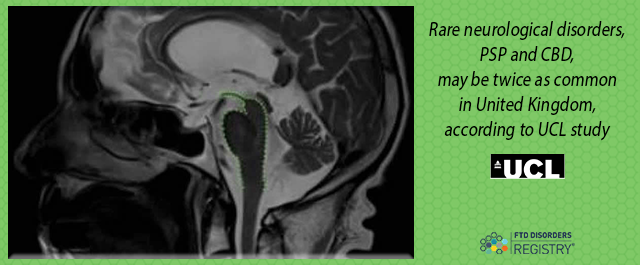PRESS & NEWS
PSP and CBD May Be Twice as Common in UK, UCL study shows

Up to 10,000 people in the UK could be living with these rare neurological disorders
Up to 10,000 people in the UK could be living with these rare neurological disorders
Two rare degenerative neurological disorders — progressive supranuclear palsy (PSP) and corticobasal degeneration (CBD) — may be twice as common as previously believed, a University College London study has determined.
Initial results from the PROSPECT study, published in JAMA Neurology, estimates that up to 10,000 people in the United Kingdom may be living with PSP and CBD, two atypical Parkinsonian syndromes.
The study, led by Professor Huw Morris and Dr. Edwin Jabbari, both with the UCL Queen Square Institute of Neurology, found that different forms of PSP and CBD had distinct patterns of clinical, cognitive, MRI, and blood protein results that can be used to improve early and accurate diagnosis.
“Surprisingly, recently described rarer presentations of PSP are as frequent as the classical form of PSP, indicating that the disease may be twice as common as previously thought,” said Professor Morris. “We hope that this improved understanding of the disease spectrum will lead to better, earlier diagnosis and ultimately to better treatments.”
The PROSPECT study is a longitudinal research program, funded by PSPA, which uses MRI scanning, blood and cerebrospinal fluid samples, genetics, and clinical assessments to find ways of tracking disease progression and improving diagnosis.
Baseline data from the first five years of the PROSPECT study showed that 50 percent of people living with PSP had a delayed diagnosis because they initially presented with symptoms similar to other neurodegenerative conditions such as Parkinson’s disease and frontotemporal dementia.
“PSP and CBD are regularly misdiagnosed with other neurodegenerative conditions such as Parkinson’s and Alzheimer’s due to the lack of specialist knowledge about these rare diseases,” said Dr. Wendy Edwards, research manager at PSPA. “These latest groundbreaking findings give PSPA the ammunition we need to campaign for increased awareness, better diagnosis, and improved care for those living with PSP and CBD.”
The study is now in its second phase. Researchers hope to discover biomarkers and diagnostic tools to enable better outcomes for people with these two disorders.
The PROSPECT study is the core research project of the UK PSP Research Network, which was established in 2012. The study began in 2014 and is funded by PSPA until 2023.
Study goals include:
- Expand recruitment to create the world’s largest PSP and CBD cohort
- Improve diagnosis by discovering diagnostic markers of PSP and CBD
- Better understand the progression of PSP and CBD to help define new treatments
- Support upcoming clinical trials and ultimately accelerate the discovery of future treatments.
A UK-wide collaborative effort, the PROSPECT study also analyzes data collected by Professor James Rowe at the University of Cambridge, Professor Michele Hu at the University of Oxford, Professor Nicola Pavese and Professor David Burn at Newcastle University, Professor Nigel Leigh at Brighton and Sussex Medical School, Dr. Alistair Church at Royal Gwent Hospital, and Dr. Chris Kobylecki and Dr. Alex Gerhard at The University of Manchester.
Together we can find a cure for ftd
The FTD Disorders Registry is a powerful tool in the movement to create therapies and find a cure. Together we can help change the course of the disease and put an end to FTD.
Your privacy is important! We promise to protect it. We will not share your contact information.



